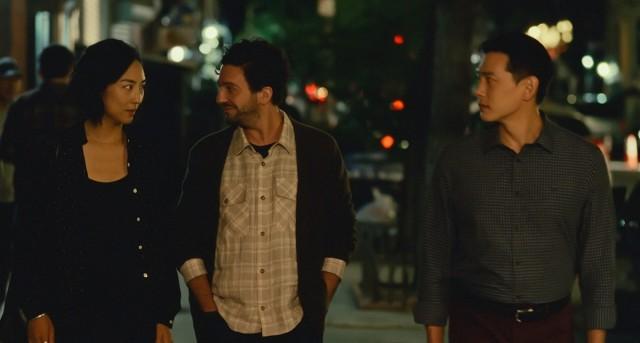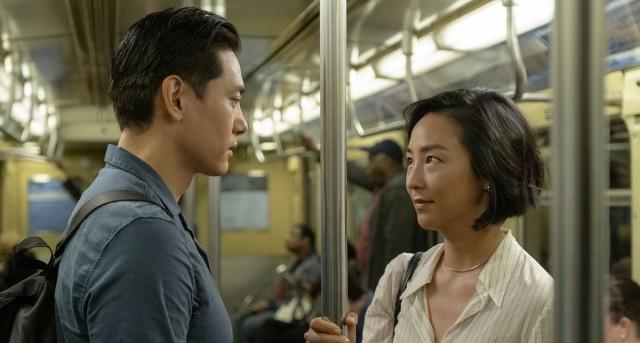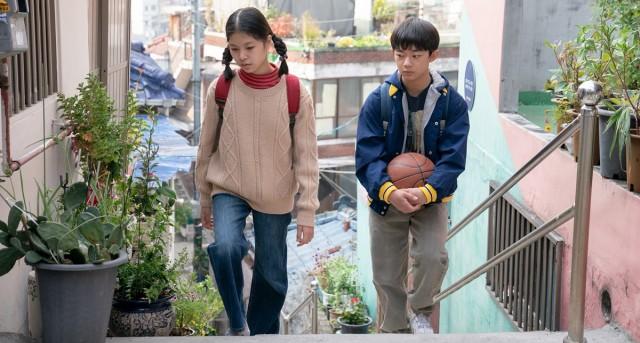'Past Lives' filmmaker Celine Song, actress Greta Lee on their film, 'inyeon,' and eyebrow acting

One movie that really tugs deep into your heart is first-time feature film director, Celine Song's romance drama "Past Lives."
The semi-autobiographical movie inspired by real events from Song's life, follows the relationship of two 12-year-old classmates – Nora and Jung Hae Sung - who develop an attraction for each other. Nora's family, however, emigrates to Toronto and the two lose contact until 12 years later, Nora marries Arthur Zaturansky and lives now in New York, and Jung Hae Sung, who broke off with his girlfriend, decides to go and visit Nora. Complicated feelings and emotions envelop them.
Starring Greta Lee (Nora), Teo Yoo (Jung Hae Sung) and John Magaro (Arthur), the movie deals a lot with people's connections or what Koreans call the "inyeon."
From Nique.net, they explain what the "inyeon" is. They write, "'Inyeon' is the connection between people — the red string of fate which tangles together across different lifetimes. Inyeon can be falling in love with someone, asking your friend for a ride home or ordering from the waiter at the restaurant you go to when there is no food in the fridge.
"If two strangers walk by each other on the street and their clothes accidentally brush, that means there have been 8,000 layers of inyeon between them," Na Young (Nora) says to Arthur. While they laugh it off as a joke in the movie, this moment is where the film reveals itself. Celine Song is telling us — as we sit silently in the dark of the theater — even this is inyeon.
Every moment of connection in our lives is the burden we carry to the next; every moment is unfinished until we build up those 8,000 layers of inyeon, and therefore, there is no such thing as 'right person, wrong time.' Every moment of connection with someone else is then inherently sacred and more infinite than our mere lifetimes."

We were able to interview Celine Song and Greta Lee in a virtual press conference and below are excerpts from that interview.
Celine, clearly this is your story. There's no ambiguity about that, but where did the desire come from to revisit such a personal odyssey as a film? Were there still unresolved feelings about the situation that you wanted to exercise? Were you hoping for some additional closure that you may not have gotten the first time around?
Celine Song (CS): It actually was so much more about this thing that happened to me personally, which was me sitting in this bar in New York City, sitting between my childhood sweetheart who is now a friend, who's coming to visit me and my husband, who I live with in New York City. And I think that it really was this moment that encapsulated a need for these three characters' lives to be retread more than anything.
So, it did not really start from there. So when it comes to the actual feelings and the complexity and my relationship to history and things like that, it started from this really subjective place of just this feeling I had in this bar and the feeling that I had towards these two people who hold keys to me, myself and my history that are very different and they can never know the other person's key to the part of my identity or selfhood that I think it can only exist in both of those worlds.
It really was turning that subjectivity into an object, which is a script. Then of course from there, turning it further into an object, which is a film, which is something where I was making with Greta.
I wasn't asking Greta to recreate a feeling or recreate a person. What I was asking her to do is to create Nora for us to find Nora together.
What started out as a personal thing, over time, became a project that really had more to do with the way that it feels to be a person who is transversing vast amounts of time and space.
What I've been loving more than anything is that this thing that is really personal and autobiographical that started from this really autobiographical moment is now becoming really personal and autobiographical for audiences.
So, it's been such a funny cycle of subjective to the objective circle and then finally coming back to being subjective again in the audience.
Greta, what was your first reaction to reading the script and then in terms of meeting Celine and realizing that you were playing some version of your writer-director? Was it difficult to create a character that was separate from the person who was going to be on the other side of the camera?
Greta Lee (GL): I first came into contact with Celine's movie was just a script that was sent to me by my agents. It was fairly out of the blue actually. The subject line was something like "Korean, do you speak it?" From there, I even felt like "Oh oh, man. I don't." I don't know what this is going to be like. I've never intended to do a movie in Korean. I didn't know Celine. I just started to read and then I read it in one sitting. My experience with the script was colossal. I really felt like it was something I had never read before. That sounds hyperbolic.
I have a very different immigrant experience than Celine and also from Nora. I'm Korean American but I was born in Los Angeles. In reading the script, it was such a visceral experience. I know this feeling and it felt so undeniable. It felt electric. It felt terrifying. It's the same feeling that we're getting to share with audiences which is it feels like science fiction.
It wasn't a matter of impersonating Celine but creating this woman.

Greta is truly astonishing in this movie. I can't imagine anyone else in this role. But I'm curious Celine if you go back to the moment of casting the part of Nora, was there something that you saw of yourself in Greta that made you or made her resonate for you? Was there something from her previous work which generally had more of a comedic bent? What was that big point of connection that made you feel like you found your person?
CS: You can only really talk about people that you end up with in these projects because the relationship is so intimate. I'm sure you can glean that the relationship that I have with my actors is one that is deeply and intimately entwined with the work that we have to do because we are showing up with people every day, right? So, I think as anything like that comes, I can only describe it as a feeling of falling in love. Just like falling in love, when you meet that person, there's just a feeling that maybe this is the right person. I'm a pretty cynical and questioning person. I think she has the soul of Nora, which is a soul that I'm looking for, which is this fire at the center of her.
To me, it was really that it was the feeling of like there's a fire in her. And I just know that I need that quality for Nora. We talked for two hours just so I could confirm over and over again that my instinct, when I first walked into Zoom to meet her, was correct. It's actually a funny thing because I'm trying to confirm it. It wasn't like she was fighting to have it at that point. I was fighting to confirm it because I really wanted it to be. It has to feel like that. I wish that there was a scientific or a thing that I could really point to and say, "Well, that really was the moment for me."
But the truth is that it is just the feeling, especially for something where she is going to do transformative and spanning decades kind of work. It is really one of those things where you can't really point to like, "I know she knows how to do that one thing." It's more like I believe in her so fully. It's about her craft. It's about her everything.
GL: Reading with Celine was amazing. Celine was describing in terms of what she wanted to do. It really was the beginning of capturing the essence of the movie, of inyeon, of this connectedness. I love that Celine sometimes I catch her telling people she thinks she and I were married in another lifetime. I just know that. Maybe 50 lifetimes ago, maybe less like 30 lifetimes ago, Celine and I were married. I just know that about it because that's just how inyeon works.
Celine, you were talking about the fire that you immediately saw in her and one of the things that I find so affecting about what Greta does in this movie is how she tempers that fire which is so palpable with this very delicate and childlike reliance on gesture and silence are a number of critical moments where she'll just nod at somebody and slow the scene down and really invite them forward.
I'm wondering, both of you feel free to weigh in on this, how you arrived at that mode of expression. I'm sure so much of it was on the page, but there is a real, beyond-the-bilingual element of the movie. There is a really specific vernacular to the way that this character speaks.
GL: It was all on the page. I really feel that. It's sort of true that in this scenario, all of us came for the script and then we stayed for the director. And there was no way we were going to know that until we were making the movie. In terms of performance, and maybe even in the direction, maybe there is that assumption that because of the style of the movie and because of the pacing and the tone and the naturalism and the acting we were like winging it or like finding it in the moment. It was a lot less sexy than that. It was so surgical and so much effort and homework.
We really were so overly meticulous in a way that I'm so grateful for. It's such a gift or something like this to chart like it was music on notes, what the emotional arc was beat to beat. We, the actors, were entrusted to do all sorts of other things in terms of examining our incredible young child actors – Leem Seung-min (as the young Hae Sung) and Moon Seung-ah (as the young Nora) and they were absolutely essential in establishing the chemistry that Teo Yoo (as Jung Hae Sung) and I were after as adult actors.
We really relied on them heavily and watched their gestures and their physicality. There are other private actor things that we did but we worked collectively. There was so much intention behind every single moment.

CS: The limit and the limitlessness of the movie are all going to live on the actor's face, right? Because that's where all the story happens. For example, a fight choreography, an action sequence, or about blocking in a complicated situation. Some of it is knowing what the plan is for the day, and how we are going to chart through the primary storytelling, which is just like in Greta's eyebrows, right?
You have to back them for every step of it, but also as a director. We talk about the script, and we will chart it together, what is each moment for what. After all that, all I can do is trust the actors. It is unbelievable what Greta was able to accomplish, which is that. We'll talk about homework, that's what we call it. But it's the work she actually showed up with on set after all the work that we did off-set. Again, it lives and dies on the actor's face. It lives and dies on Greta as Nora.
It's no pressure or anything. No pressure. Part of the double mode director was to pressure the fuck out of them.
Greta, you must really work well under pressure and your eyebrows, there's some eyebrow acting in this movie. Did you have an opportunity to work with Moon Seung-ah who plays the younger version of Nora. Was she able to reverse engineer an element of her performance or something she had seen of you or vice versa? Was there some synchronicity?
GL: It was only in one direction. That's what's amazing. I got so much from her, but I don't think that she needed anything from me. The only people that I did chemistry readings with were the children. Of course, their chemistry has to be so powerful that he has to carry 24 years of connection. The child actors don't have many lines. Their lines are basically goodbye. That's the number of lines they really have.
CS: I was looking for the right boy for her and I had some great actors show up for it. And the boy who ended up playing the little Jung Hae Sung did such a beautiful piece of ad-lib where I asked him to basically ask the little Nora to stay in Korea and keep being friends with him. And this boy, Leem Seung-min, did such a beautiful piece of ad-lib that he made the little girl, Moon Seung-ah cry. There was also a chemistry read that we filmed, and I know Greta and Teo were just able to totally pull from it.
Teo Yoo was saying earlier that it was like a "Forrest Gump." Their chemistry has to remain like children's chemistry because that is when they were connected. The hand gestures, the physicality between the two of them, the laughter, and the crying too because we were shooting out of order. So that last scene of her crying as an adult had to match what Moon Seung-ah was going to do in Korea.
—MGP, GMA Integrated News



